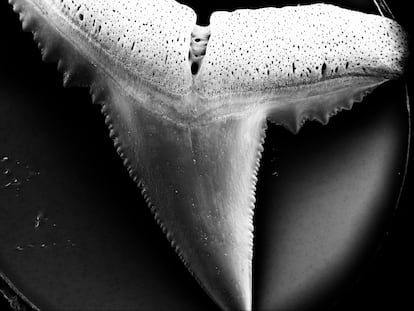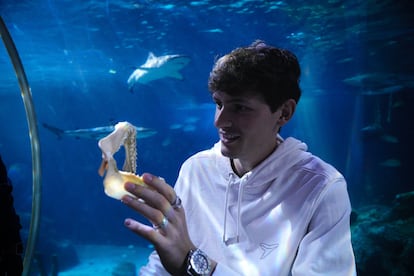Shark teeth may be their Achilles heel, due to ocean acidification.

Shark teeth are one of nature's most sophisticated weapons. For 400 million years, evolution has been perfecting with biological precision one of the animal world's most fearsome teeth. However, there is a future scenario in which things could change. A new study, published this Wednesday in the journal Frontiers in Marine Science , proposes that ocean acidification—a direct consequence of human carbon dioxide emissions—alters the structure of the teeth of the blacktip reef shark ( Carcharhinus melanopterus ) .
The researchers designed an experiment in which they collected teeth that sharks had naturally shed from a German aquarium and subjected them to artificial pH conditions of 7.3, the level at which some studies project ocean acidification by 2300. The changes were notable: root corrosion increased, cracks and perforations appeared in the enamel, and the serration of the crowns changed. The authors interpreted this wear as weakening the structures and making the teeth more fragile and prone to breaking.
Maximiliam Baum, a scientist at the University of Düsseldorf and author of the research, explains that "the most surprising thing was that the exposed surface of the tooth increased" with acidification. He continues: "At first I thought it was an error in the images, but it was something else." The teeth didn't grow, but rather became rougher and expanded. "That larger surface area means more corrosion," he notes. The researcher proposes a metaphor to explain the effect: seawater of the future would be for shark teeth, something similar to what Coca-Cola is for humans. "It's a dramatic example, of course, because the drink has a pH of 3, much more acidic, but it gives us an idea of the long-term effect that ocean acidification can have on these animals ," Baum explains.
For Claudio Barría Oyarzo, a doctor in Marine Sciences and a shark specialist, the study, like all others, has limitations. “The most important is that it was conducted with teeth that had already been shed, without the intervention of physiological processes,” he says. Therefore, the results reflect only the effects of chemical corrosion on inert tissue and not the response of a living organism.

Eric Clua, lead researcher at the Université Paris Sciences et Lettres, agrees, adding that the study "is very theoretical, and the results should be taken with caution." Sharks' ability to adapt to new stressors is immense, the expert emphasizes. For example, in some shark species, when females can't find a male, they resort to parthenogenesis to reproduce without fertilization, using only their eggs. Others have demonstrated an unusual ability to maintain a stable pH balance in their blood and tissues, even in acidified waters, suggesting some potential for adaptation. "Although interesting, this study shows a possible detrimental effect, but it doesn't prove it at all," he adds.
The author of the new publication details that there are two possibilities for variation in the results of their work if the experiment were tested on live specimens. “One is that sharks could repair or remineralize the damage. But in more acidified waters, it's more difficult to obtain calcium carbonate, and the energy cost would be higher,” he comments. While shark teeth are composed mostly of fluorapatite, a material theoretically more resistant to acidification than calcium carbonate, obtaining these components in acidified waters is more energetically costly and they still degrade in this type of environment. Since sharks replace their teeth every few weeks, they would need a lot of material. “Perhaps they could adapt, but at the cost of a great energetic effort, or they could simply lose their teeth prematurely and have to produce more, which is also a challenge for them, ” Baum mentions.

That's not all. Barría also questions the fact that "the experimental conditions were extreme," as some studies indicate that ocean pH will not change at such radical levels. The author of the new study defends his choice: "No one had ever done an experiment like this before, and we wanted to see the overall effects." Baum disagrees with the predictions about ocean acidification and believes that "what will happen in 200 years could be brought forward by 100."
The future will put sharks to the test. “These animals depend on their teeth to capture and process prey; if these teeth don't function properly, it could translate into reduced energy intake, reduced growth, and ultimately, lower survival and reproductive success,” Barría explains.
The latter, Baum adds, is because "teeth aren't just used for hunting prey: in reef sharks, males use them to hold females during reproduction." Male teeth are specially adapted for this task, so worn teeth could lead to much more than just feeding problems.
Other more immediate threatsSharks are keystone species in many ecosystems. If their teeth were to lose their effectiveness, there could be a major ecological impact . “I don't think sharks will die from this alone, but we need to consider the cumulative effects of overfishing, ocean warming, habitat degradation, and acidification, which also affect their skin,” Baum says.
“Teeth could be an Achilles' heel for sharks, but in the long term,” Clua explains. “I suppose,” he continues, “that they will have to face more critical problems , both existing and future.” Barría is confident that this will not be the case: “Sharks have been on the planet for more than 400 million years, which speaks to their great resilience to change.” Of course, these movements have never before been so drastic and accelerated.
EL PAÍS




